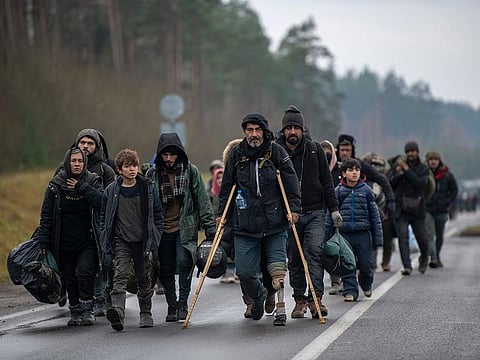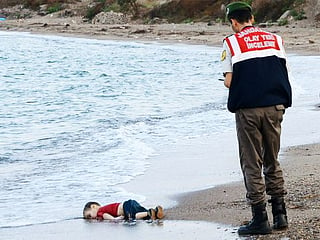Belarus clears migrant camp, easing border standoff with Poland
Iraqi Kurd who spent $5,000 to get to Poland border, vows to stay in Belarus ‘until I die'

BRUZGI, Belarus: Belarusian authorities on Thursday cleared the encampments at the main border crossing into Poland, where thousands of migrants had been living in frigid and increasingly squalid conditions, removing for the moment a major flash point that has raised tensions across Europe.
The patch of land nicknamed “the jungle” by migrants - only days ago the site of violent clashes between asylum-seekers trying to push through the razor wire and Polish security forces blasting them with water cannons - quickly became a wasteland of garbage, abandoned tents and smoldering fires.
The clearing of the camps eased the immediate suffering of the migrants who had been living in the open air in miserable conditions, as they were moved by Belarusian authorities into a giant warehouse. And it took pressure off a border that the European Union had been watching with growing alarm, fearing that it would be breached by a new wave of migrants, even if Western leaders - and Poland - are skeptical that the volatile standoff is drawing to a close.
The situation also left the Belarusian president, Alexander Lukashenko, with a troubling dilemma: what to do with all the people he lured to Belarus but who, blocked from entering Europe, are fast becoming a heavy burden on his own country?
Zana Ahmed, a 26-year-old Iraqi Kurd who spent around $5,000 to get to the border with Poland, just yards from making it into the European Union, vowed to stay in Belarus “until I die” unless he somehow gained entry to Europe.
Chancellor Angela Merkel of Germany has taken the lead in trying to find a diplomatic way out of the crisis, talking with Lukashenko, but has given no hint that she will repeat the welcome offer she made to migrants in 2015, when more than 1 million people poured into Germany.
On Thursday, escorted by Belarusian guards wearing black balaclavas and carrying Kalashnikov rifles, a bedraggled procession of migrants trudged away from the frontier, abandoning their encampments on the border like a routed army. Hundreds of others had been cleared from the site and moved to the warehouse on Wednesday.
By nightfall, what had been a sprawling makeshift settlement with thousands of people desperate to enter the European Union, had become an eerily silent wasteland. Scattered across the ground were the remnants of the migrants’ efforts in recent weeks to sneak or break into Poland - rubber boots, pruning shears, a saw, a crowbar and tools for survival in the freezing forests that straddle the border.
Despite leaving the immediate vicinity of the border to take shelter from the biting cold in the warehouse, many migrants held out hope they might still get to Europe and, failing that, settle in Belarus rather than being forced to return home, which for many is Iraq.
Yuri Karayev, an aide to Lukashenko representing the surrounding border region of Grodno, declined to answer questions about what lies in store for the migrants now that they have given up their hold on the patch of forested border land they had occupied for weeks - but not their desire to get to Europe.
Poland, backed by fellow members of the European Union, shows no sign of relenting on its hard-line stand against migrants trying to enter the country. Poland’s prime minister told a German newspaper that “by defending our border, we defend the whole of Europe.”
The migrants’ retreat from what the European bloc has described as the front line of a “hybrid war” unleashed by Lukashenko is likely to reduce tensions on the border, although it is unclear for how long.
Iraqi repatriation flight
The Group of 7 leading industrial powers castigated the Belarusian leader in a statement on Thursday, charging him with the “orchestration of irregular migration across its borders.”
For the moment, most of the migrants being housed in the warehouse - which is situated less than a mile from the Bruzgi border crossing - say they have no intention of returning home.
An Iraqi repatriation flight departed from Minsk, the Belarusian capital, on Thursday carrying several hundred migrants who had given up on getting into the European bloc. The plane, a Boeing 747 operated by Iraqi Airways, the national carrier, landed Thursday evening in Irbil, in Iraq’s northern Kurdistan region, and then continued on to Baghdad.
Many of the Iraqis still crammed into the warehouse, however, say they do not plan to take future flights back to Iraq.
“I will stay here for months or years and if they try to deport me to Iraq I will go back to the jungle,” vowed Suleiman Sabah, an Iraqi Kurd who arrived at the warehouse clutching plastic bags holding filthy clothes and clean blankets provided by Belarusian aid workers.
For Masoud Mahdi, 35, who had spent 11 days in “the jungle” with his pregnant wife and young daughter, it was enough to just get out of the cold. “We were living worse than dogs,” he said as he made his way to the warehouse.
“Last night was impossible,” he added. “It was raining and freezing and we had to leave.”
Still, Mahdi said, he did not want to return to Iraqi Kurdistan. He wanted to make it to Germany. “If I get sent back to Iraq I will kill myself,” he said.







